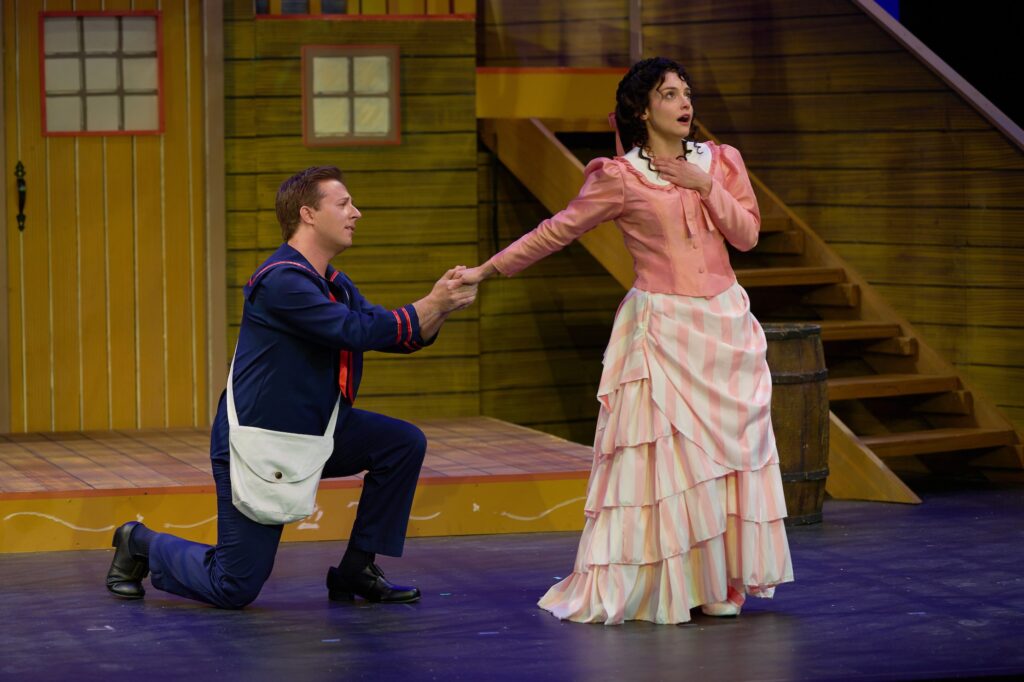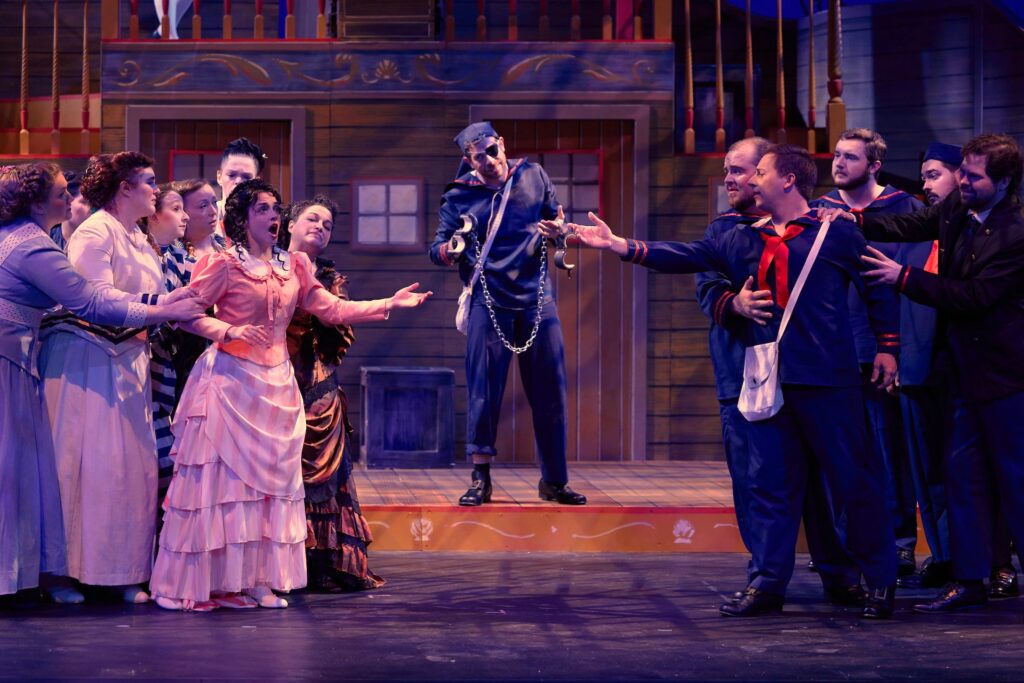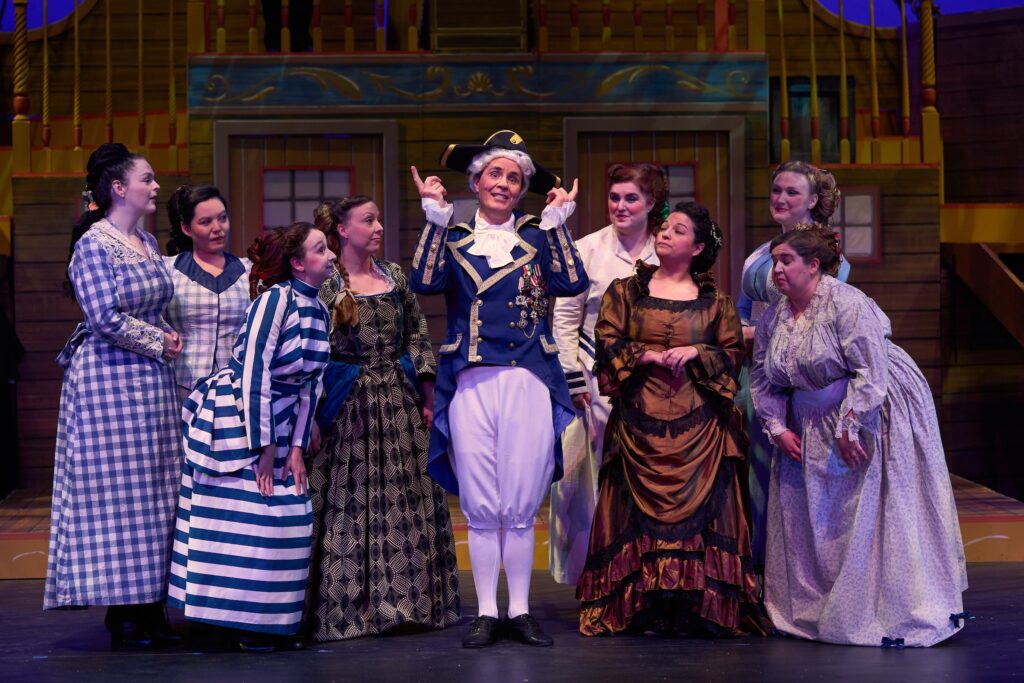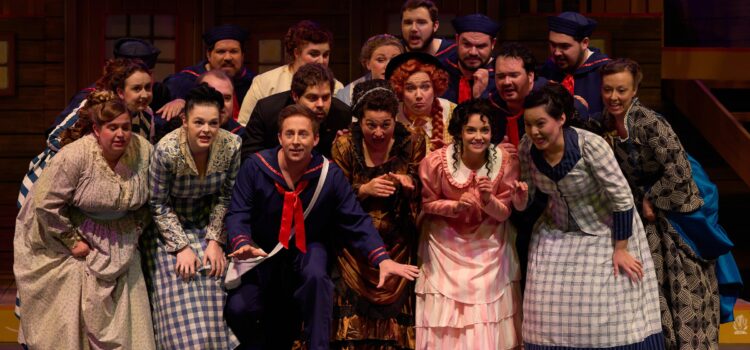By CB Adams
Timing, as they say, is everything. And Winter Opera’s sprightly production of Gilbert and Sullivan’s “H.M.S. Pinafore” succeeds thanks to all sorts of good timing.
First, Winter Opera’s timing was perfect – after the intensity of the recent elections – for anyone in need of a good laugh combined with catchy, rhythmic melodies. Yet, it was more than merely a distraction from the news cycles. It was an engaging and fulfilling experience starting from the first notes of the overture.
“Pinafore,” which debuted in 1878, endures because it offers both entertainment and a clever commentary on British social class and the workings of the naval hierarchy – a commentary that is relevant and nearly universal. The combined talents of conductor Scott Schoonover and director John Stephens delivered fresh vitality to “Pinafore.”
That’s a double dip of timing to Sullivan’s lively score and Gilbert’s witty lyrics – delivered with panache. Schoonover in particular captained this production’s consistent buoyancy, bright tempos and lively orchestrations.
Stephens injected contemporary energy into the operetta’s classic routines and underscored how bureaucratic absurdities and class distinctions are still relevant today.

This production’s success relied on performances that combined vocal robustness with affection and irony. Brittany Hebel, as Josephine, and Brian Skoog, as Ralph, gave particularly charming performances, delivering their roles with vocal clarity and comic finesse. Hebel’s expressive soprano made Josephine’s role memorable with her strong top notes and flexibility – essential traits for Gilbert and Sullivan heroines.
Skoog’s warm tenor and cheery portrayal of Ralph added depth to their onstage romance. Jacob Lassetter’s Captain Corcoran was dignified and fatherly, effectively balancing authority with warmth. Gary Moss, playing Sir Joseph Porter, embodied the absurdity of his character with flair, delightfully showcasing Sir Joseph’s inflated self-importance as a government figure who commands the Royal Navy despite never having set foot on a ship.
More good “timing” was casting Emily Harmon in the role of Little Buttercup. She delivered playful mischief to the character, particularly in her duet “Things Are Seldom what They Seem” – a standout from the entire performance. Another was Tyler Putnam’s portrayal of the cynical seaman, Dick Deadeye. Putnam was immensely entertaining, vocally hearty, and ably added a touch of gritty realism to the otherwise farcical narrative.
Scenic designer Scott Loebl created a straightforward – and perfectly sized – quarterdeck set that captured the essence of a Victorian ship, allowing the performers’ comedic interactions to shine. Costume designer Jen Blum-Tatara and lighting designer Michael Sullivan enhanced the production’s ambiance, with era-appropriate attire and crisp lighting that brought out the unique personalities of each character.

Especially noteworthy were the performances of the ensemble songs that bookend the operetta: “We Sail the Ocean Blue” and “Oh Joy, Oh Rapture Unforeseen.” The first featured the chorus of sailors in a performance with definite “Anything Goes” vibes. The latter was a triumphant and celebratory rendition in which a stage full of characters happily rejoice in the resolution to the operetta’s romantic entanglements and class conflicts.
The combination of skilled musicianship, clever staging and talented vocal performances made this rendition of “H.M.S. Pinafore” a humorous, musically satisfying experience that exemplified why this operetta endures – time and again.
Winter Opera’s production of “H.M.S. Pinafore” ran November 8 and 10, 2024 at the Kirkwood Performing Arts Center.


CB Adams is an award-winning fiction writer and photographer based in the Greater St. Louis area. A former music/arts editor and feature writer for the St. Louis Globe-Democrat, his non-fiction has been published in local, regional and national publications. His literary short stories have been published in more than a dozen literary journals and his fine art photography has been exhibited in more than 40 galley shows nationwide. Adams is the recipient of the Missouri Arts Council’s highest writing awards: the Writers’ Biennial and Missouri Writing!. The Riverfront Times named him, “St. Louis’ Most Under-Appreciated Writer” in 1996.

